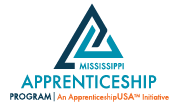Mississippi, NVIDIA partner to advance AI education, workforce development

Originally posted by Magnolia Tribune – June 19, 2025 NVIDIA’s Louis Stewart joined Governor Tate Reeves at a press conference on June 18, 2025 (Photo from NVIDIA Newsroom on X) “These are the in-demand jobs of the future—jobs that will change the landscape of our economy for generations to come,” Governor Tate Reeves said. A memorandum […]
DSU Certifies New Crop of AG Pilots

Originally posted by AgAir Update Staff – June 17, 2025 DSU Aviation students completing the Agricultural Aircraft Operations Career Pathway Program were recognized during their recent certification ceremony. CLEVELAND, Miss. – Delta State University (DSU) hosted a certification ceremony on Thursday, May 29, to recognize graduates of the Agricultural Aircraft Operations Career Pathway program. The event was held at […]
Apprenticeship: Earn-And-Learn Opportunities Can Benefit Workers and Employers

Originally posted by U.S. Government Accountability Office on Apr 28, 2025. Publicly Released: May 28, 2025. This Q&A examines earn-and-learn opportunities, which can give individuals a mix of work experience and instruction on in-demand skills—while they earn a wage. We found at least 26 federal programs that can help provide these opportunities. For example, the Labor Department and state […]
HII’s Ingalls Shipbuilding Hosts “Signing Day” for Shipbuilder Academy Graduates

Originally posted by The State Chamber of Commerce Mississippi Economic Council PASCAGOULA, Miss. — HII’s (NYSE: HII) Ingalls Shipbuilding hosted a “signing day” for the 2025 graduates of its Shipbuilder Academy at the shipyard Wednesday. This year, 43 students were offered full-time positions at Ingalls, marking the beginning of their careers with HII. The “signing day” […]
Tino’s Pet Grooming to Open First-Of-Its-Kind Dog Grooming Apprenticeship Programs through U.S. Department of Labor

Originally posted by CountOnNews2 BRANDON, MS, UNITED STATES, May 13, 2025 /EINPresswire.com/ — Tino’s Pet Grooming will launch Tino’s Apprenticeship Program, a first-of-its-kind dog grooming apprenticeship through the U.S. Department of Labor (DOL), on June 1st. Tino’s Pet Grooming was registered by the DOL as part of the National Apprenticeship System in April, making this […]
Jobs for the Future Launches New $2M Fund to Provide Financial Assistance to Apprentices with Support from Google.org

Originally posted by Jobs for the Future | April 8, 2025 The National Apprentice Fund will directly support hundreds of apprentices in growing sectors of the economy that pay competitive wages and offer opportunities for upward career mobility BOSTON, April 8, 2025 – Jobs for the Future (JFF), a national nonprofit transforming the U.S. workforce […]
ADVANCING ARTIFICIAL INTELLIGENCE EDUCATION FOR AMERICAN YOUTH

Originally posted by By National Goveners Association | April 23, 2025 By the authority vested in me as President by the Constitution and the laws of the United States of America, it is hereby ordered: Section 1. Background. Artificial intelligence (AI) is rapidly transforming the modern world, driving innovation across industries, enhancing productivity, and reshaping the way […]
PREPARING AMERICANS FOR HIGH-PAYING SKILLED TRADE JOBS OF THE FUTURE

Originally posted by By National Goveners Association | April 23, 2025 By the authority vested in me as President by the Constitution and the laws of the United States of America, it is hereby ordered: Section 1. Purpose. To maximize my Administration’s historic investments in America’s reindustrialization and economic growth, my Administration will fully equip the American […]
Let’s Get Ready to Build Education to Workforce Pipelines

Originally posted by By National Goveners Association | March 24th, 2025 A top Let’s Get Ready! priority is measuring what works – and what doesn’t. There are plenty of bright spots in the “what works” category, several of which were represented at a recent initiative convening in New York City. Innovative schools, programs and organizations are succeeding […]
HII’s Ingalls Shipbuilding Celebrates Apprentice School Graduates

Originally posted by By | March 24th, 2025 PASCAGOULA, Miss. — HII’s Ingalls Shipbuilding division celebrated its newest class of apprentice graduates during a ceremony at the shipyard today. The event recognized the hard work and dedication of the graduates who have completed the three-to four-year program combining classroom instruction with hands-on shipbuilding experience. Ingalls Shipbuilding […]



